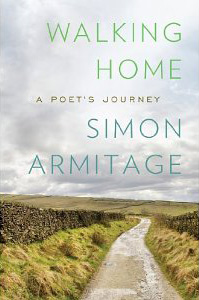Book Notes
 Simon Armitage, Walking Home; A Poet's Journey (New York: W.W. Norton, 2013), 285pp.
Simon Armitage, Walking Home; A Poet's Journey (New York: W.W. Norton, 2013), 285pp.
One of England's distinct traditions is that of the "walking holiday." In America we'd call it hiking, but that doesn't capture the exact essence of the experience. My wife and I have hiked two of England's fifteen National Trails, both of which were about 200 miles long — the Wainwright coast-to-coast path that starts north of Manchester on the Irish Sea and finishes on the North Sea, and Offa's Dyke Path that traverses the country along the border with Wales from north to south along an eighth-century earth work.
Simon Armitage, a well known British poet, decided to hike England's oldest path, and perhaps its most arduous one, the 260-mile Pennine Way. The PW was opened in 1965; it marked the political movement of "walking holidays" only for the wealthy few to rambling for anyone who had the chops to get out there, be it for a day, a week, or more. Armitage had a personal interest in that the village of Marsden where he was born sits on the Pennine Way, and so he conceived of a "walk home." He did so with the conscious realization that other famous writers like Homer and Wordsworth wrote about and from their own long journeys.
Whereas most people walk the Pennine Way from south to north, Armitage walked in the opposite direction. This allowed for his home village of Marsden to be more of a literal and not merely literary destination. There was also a second difference to his walk. For each of his nineteen nights on the path he did a poetry reading ("256 miles of begging"), after which they passed around the hat (a sock, actually) and he was "paid" for his performance. Each night he reports his attendance and counts his "take." And here the English traditions of walker and poet combine. It's hard to imagine an American poet who is recognized on the streets of any small town in America, much less that he or she could anticipate an audience of several dozen people who show up on a rainy night to hear a poetry reading, then stuff a $10 bill in a sock to say thanks. But that's what they do in England.


